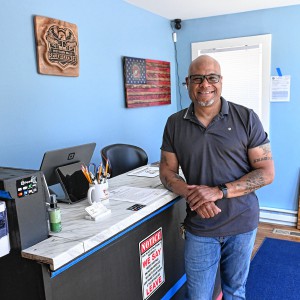Guest columnist Suzanne Stillinger: Early education and child care solution at hand

Design by Matt/StockSnap Design by Matt/StockSnap
| Published: 10-15-2023 9:43 PM |
I don’t often open the closet where my blue dress shirts, slacks, and blazers are hanging. I seldom have the opportunity to wear them in my line of work.
My shirts are a canvas for globs of paint, glue and not infrequently, boogers. My pants are a towel for the muddy hands of a 4-year-old who fell down on a rainy day. My shoulders are damp with the tears of a toddler who is missing their family and needs a cuddle from their trusted teacher.
But I opened that closet this morning and I laid out my dress clothes for a visit to the Massachusetts State House on Oct. 17, in the hope that this trip will help allow teachers like me to keep painting and cuddling for many years to come.
As national media coverage about the “child care cliff” warns of the looming collapse of a keystone of the U.S. economy, Massachusetts is uniquely poised to not only avoid this crisis, but to provide a lasting financial foundation for child care providers and families across the state. Twin bills in the House and Senate, dubbed Common Start, would cap the cost of child care in Massachusetts at 7% of a family’s income, lock in essential state subsidies for care providers, and help rebuild the educator workforce by offering better wages.
As I check to make sure that the fancy work clothes still fit, I cannot help but reflect on a very similar trip 10 years ago, when related policy decisions had a negative outcome and a devastating impact on my work and life.
In 2013, I had taken a day off from teaching in my Head Start classroom in West Springfield because a legislative vote was scheduled on a bill to increase pay for early childhood educators who serve some of Massachusetts’ most vulnerable children and families. I was intimidated by the magnitude of the building, the metal detectors and marble, and nervous because we were such a small group.
I gathered outside of chambers with just a handful of preschool teachers from across the state, and we did our best to make our case to the legislators rushing past.
Article continues after...
Yesterday's Most Read Articles
 My Turn: Quabbin region will never see any benefits from reservoir
My Turn: Quabbin region will never see any benefits from reservoir
 As I See It: Between Israel and Palestine: Which side should we be on, and why?
As I See It: Between Israel and Palestine: Which side should we be on, and why?
 New USDA offices in Greenfield to aid staffing increase, program expansion
New USDA offices in Greenfield to aid staffing increase, program expansion
 Longtime Orange public servant Richard Sheridan dies at 78
Longtime Orange public servant Richard Sheridan dies at 78
 Retired police officer, veteran opens firearms training academy in Millers Falls
Retired police officer, veteran opens firearms training academy in Millers Falls
 Four Rivers boys knock off Xaverian to win Four Rivers Ultimate Tournament on Saturday (PHOTOS)
Four Rivers boys knock off Xaverian to win Four Rivers Ultimate Tournament on Saturday (PHOTOS)
One of the most heartbreaking truths about choosing a career in early childhood education is that most of us live in poverty. The first time I stepped onto those marble floors, I was on food stamps and fuel assistance because I was making less than $15,000 a year as a full-time lead teacher.
The bill did not pass, and a few months later, the government shutdown over the Affordable Care Act forced my Head Start site to close its doors. Suddenly, those children and families were without child care or any of the other support services we offered. Just as suddenly, I was unemployed and uninsured. I was also 10 weeks pregnant.
It was only through extreme luck that I had a soft landing. I found a teaching position that paid a living wage and an employer who cheerfully added, “you can bring your baby to work with you!” Most parents in my position would need to join a waitlist early in their pregnancy in order to secure a child care spot many months down the road. Those lucky enough to find a spot would be facing an average cost exceeding $20,000 a year.
Many things have changed in the 10 years since I first spoke with legislators in that building. Teacher pay has increased, but has not kept pace with the rising cost of living. The pandemic both underscored the importance of early childhood education and decimated our workforce. Teachers left in droves due to low pay, so it is even more difficult to find care than it was a decade ago.
Child care isn’t working for anyone right now. It isn’t affordable for families. It doesn’t pay a living wage. There aren’t nearly enough child care spots for all of the children who need them, and this scarcity is draining billions from the Massachusetts economy.
So I am heading back to the State House to deliver testimony to the Joint Committee for Education in support of these Common Start bills. Ten years ago, only two dozen of us stood together to make our case. This time around, we need more, many more. More voices, more written and in-person testimony, and more constituents to reach out to their legislators and tell them why Common Start is important for our state.
When I return, I’ll be happy to be back in my work clothes and caring for the young children at our school, messes and all. I am hopeful that my trip will help ensure that many more children, families, and teachers in Massachusetts will get to experience the joy of an early education and care system that truly works for everyone.
Suzanne Stillinger is an early childhood teacher leader and accessibility coordinator at New Village Preschool in Northampton. She is a 2023-2024 Teach Plus Senior Writing Fellow and Senior Policy Fellow.

 Guest columnist Daniel Cantor Yalowitz: Being accountable a marker for maturity
Guest columnist Daniel Cantor Yalowitz: Being accountable a marker for maturity Dennis Merritt: Would we support a Sanders power grab?
Dennis Merritt: Would we support a Sanders power grab? Jonathan Oltman: Thank you Carolyn Shores Ness
Jonathan Oltman: Thank you Carolyn Shores Ness
